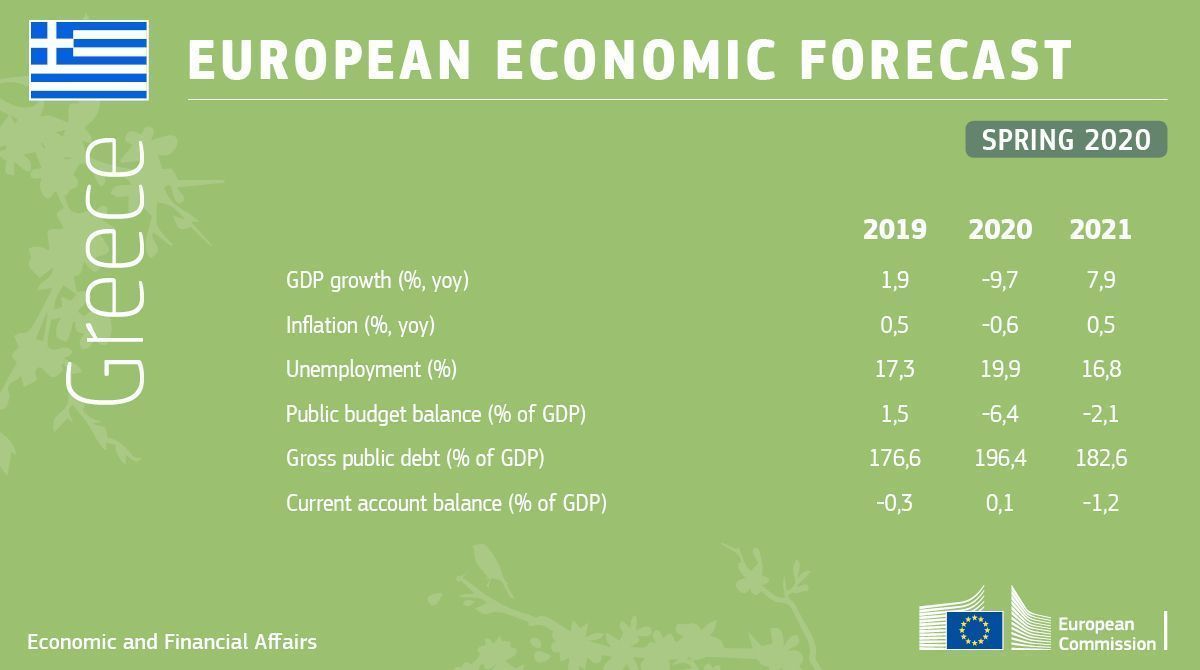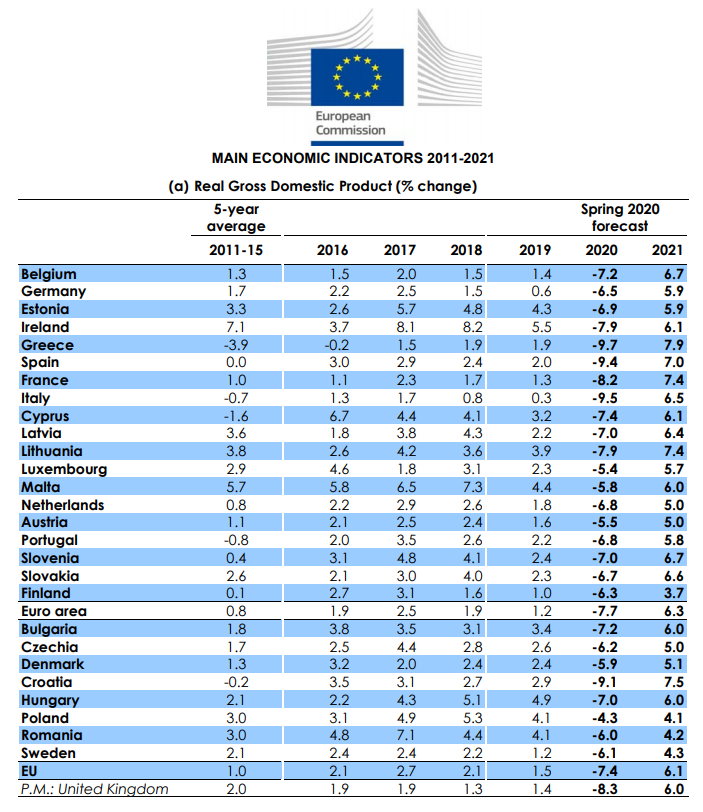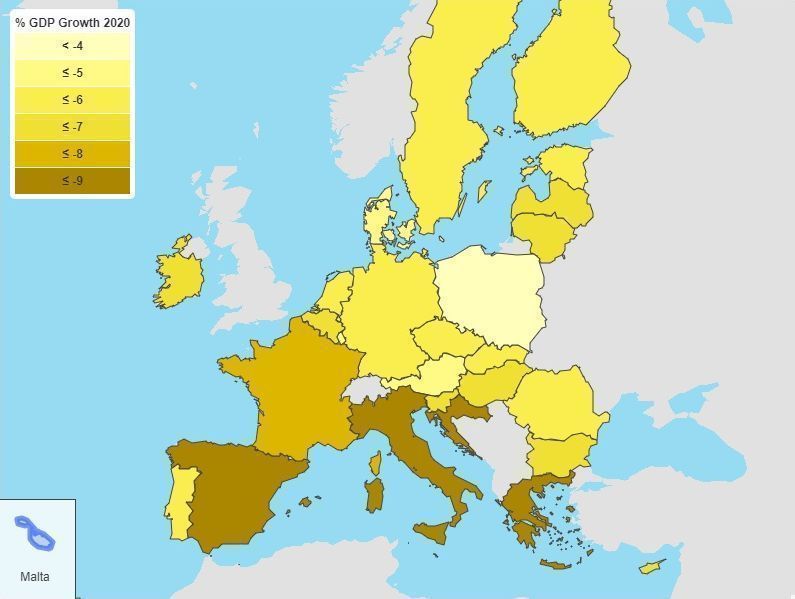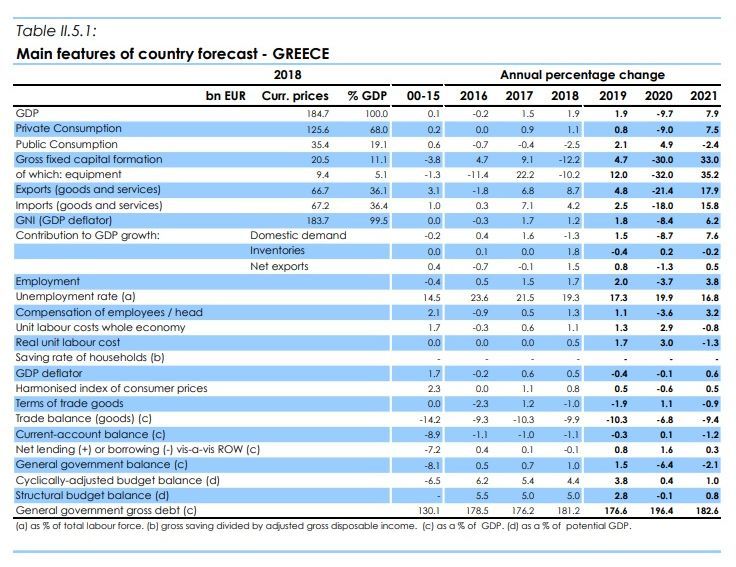Covid-19 to Hurt Greece the Most in the EU
Greece’s economy this year is expected to be hit severely by the Covid-19 pandemic and the counter measures taken to limit its spread, according to the European Commission’s Spring 2020 Economic Forecast released on Wednesday.
The forecast gives a discouraging picture for Greece in 2020, as it says the country’s GDP is expected to contract by 9.7 percent this year – the highest out of all EU countries – and its unemployment rate may reach 19.9 percent from 17.3 percent in 2019. However, the Commission says a rebound should be expected in 2021.
Regarding the the euro area as a whole, GDP is expected to contract by 7.7 percent.
“Economic activity in Greece, Italy, Spain, Croatia, and to a lesser extent France are forecast to contract the most,” said Paolo Gentiloni, European Commissioner for the Economy, during a press conference.
On Greece, the forecast shows that the impact of the crisis is expected to be large due to the importance of the hospitality sector in the country and the high share of micro enterprises, which are particularly vulnerable.
Greek tourism to be affected in Q3
According to forecast’s chapter on Greece, while the main effects of the lockdown are expected to be concentrated in the second quarter of this year, Greece’s large tourism sector is likely to be affected in the third quarter as well, as restrictions on travel are expected to remain in place and foreign demand for overseas travel may remain subdued.
“Since more than 70 percent of tourism receipts are concentrated in the main summer months, impediments during this period would have a large impact on overall exports of services in 2020,” says the Commission.
Moreover, the Commission says Greece’s heavy exposure to travel restrictions is a source of downside risks.
“Due to the strong concentration of tourism in the summer months, even a short prolongation of restrictions beyond what is assumed in the baseline could have a strong downward effect.”
Moreover, due to the global nature of the crisis, exports in Greece are expected to suffer strong declines in 2020. The country’s main export markets are expected to be amongst the worst affected countries, leading to a drop in demand for Greek goods and services, also amplified by the large share of tourism and shipping in exports.
160,000 jobs could be lost
“Despite the swift policy response, the strong contraction in output is forecast to take a toll on employment,” the forecast continues.
According to the Commission, while the measures introduced by the Greek government to protect the labour market are expected to avoid large-scale lay-offs and insolvencies, some 160,000 jobs could still be lost due to the crisis and the unemployment rate could rise to 19.9 percent in 2020.
“The partial recovery in 2021 is expected to have positive effects on the labour market, bringing the unemployment rate down again, to about 16.5 percent.”
Consumer prices are expected to drop by 0.6 percent in 2020 – and see a limited increase in 2021 – due to the downward pressure from wages, energy prices and industrial production.
The forecast also sees private consumption in Greece experiencing a strong decline this year amid limited consumption opportunities during the lockdown and falling disposable income.
Investment is also expected to be strongly affected by the increased uncertainty and lower turnover in 2020 but, according to the Commission, the liquidity support provided by the Greek government and the EU institutions should help companies to bridge the lockdown period and speed up the recovery.
In conclusion, the Commission’s forecast says the cost of tackling the crisis will take toll on Greece’s primary balance.
The general government deficit is forecast to reach 6.4 percent of GDP in 2020 and to decrease to about 2 percent in 2021 based on a no-policy-change assumption.
Public debt is expected to increase to around 196 percent of GDP in 2020 before declining to around 183 percent in 2021, supported by the economic recovery.
“Nevertheless, the crisis in Greece is expected to be followed by a rebound in 2021. The recession and the cost of fiscal measures to tackle the crisis is expected to lead to a sizeable deficit in 2020,” the Commission says.









